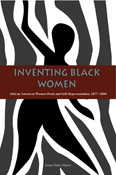Inventing Black Women
African American Women Poets and Self-Representation, 1877Ð2000

- Author(s): Mance, Ajuan Maria
- Series:
- Imprint: Univ Tennessee Press
- Publication Date: 2008-11-25
- Status: Active
- Available in Paper: Price $26.95 | Buy Now
- Leaf eReader required for PDF ebooks
“Ajuan Mance’s original and provocative study fills a gap in the scholarship on African American women poets. The historical sweep of her analysis of these poets’ efforts at self-representation is as impressive as the depth of her analysis of individual poems. Students and scholars of African American poetry or of African American women writers will find Professor Mance’s study a rich, invaluable resource. Inventing Black Women incisively delineates the historical contexts that shaped the intricate and troubled relationships among gender, race, and poetry.”–Virginia C. Fowler, Virginia Tech University
Inventing Black Women fills important gaps in our understanding of how African American women poets have resisted those conventional notions of gender and race that limit the visibility of Black female subjects. The first historical and thematic survey of African American women’s poetry, this book examines the key developments that have shaped the growing body of poems by and about Black women over the nearly 125 years since the end of slavery and Reconstruction, as it offers incisive readings of individual works by important poets such as Alice B. Neal, Maggie Pogue Johnson, Alice Dunbar Nelson, Sonia Sanchez, Lucille Clifton, Audre Lorde, and many others.
Ajuan Maria Mance establishes that the history of African American women’s poetry revolves around the struggle of the Black female poet against two marginalizing forces: the widespread association of womanhood with the figure of the middle-class, white female; and the similar association of Blackness with the figure of the African American male. In so doing, she looks closely at the major trends in Black women’s poetry during each of four critical moments in African American literary history: the post- Reconstruction era from 1877 to 1910; the Harlem Renaissance of the 1920s; the Black Arts Movement from 1965 to 1975; and the late twentieth century from 1975 to 2000.
Inventing Black Women will prove an invaluable resource for scholars and students of American literature, African American studies, and women’s studies.
